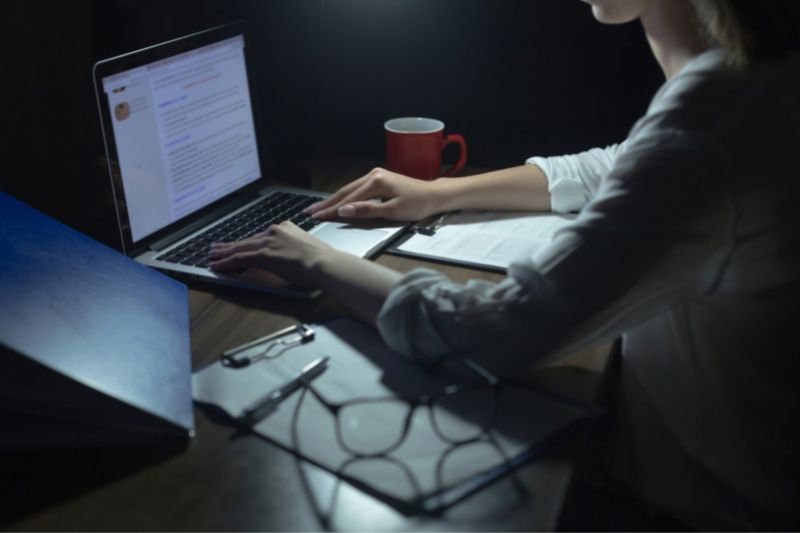There are a number of reasons Why Do I Work Better At Night? For some, it’s simply because there are fewer distractions, and they can focus more easily. Others find that they’re more productive when they have uninterrupted time to work.
And still, others find that they do their best thinking when it’s quiet, and they can think more creatively. Whatever the reason, there are several people who find that they work better at night.
Which Time of the Day Are We Most Productive?
Scientists from Monash University in Australia and the University of Granada in Spain claim that lunchtime is the optimal time for productivity. These universities published a paper that analyzed half a billion exams taken by students at UK universities. According to their research, students performed at their best at 1:30 p.m.
The most productive time for everyone is different. Depending on your chronotype, it is possible to be more productive at lunchtime than in the morning. Read on to find out why am i only productive at night.
Why Do I Work Better At Night?
1. Peace and Quiet
Night-time is quieter and more peaceful than daytime. The quiet of the night will help you focus better without interruptions, leading to greater productivity.
2. Alertness
People who stay up late at night are more alert and focused than those who wake up early. They are more productive in the morning hours than during the day.
3. Social
Because they are more social than people who like to stay up late, night owls are more social. This makes them happier and boosts their productivity.
4. Energy Burst
People are often led to believe they feel tired at the end of the day. Studies show that some people have energy spikes at night. This allowed them to be ready for any challenge and prepared to take on the world.
5. Concentration
Night Owls have higher intelligence and concentration levels than other birds. A study with 15 nightbirds and 16 early risers showed that the concentration of the early risers dropped after 10 hours of work, while the attention of the night owls improved. This allows them to be more productive at night.
6. Flexible sleeping patterns
Some people can fall asleep whenever they like. People with this ability can use night-time peace to do their jobs rather than being distracted by many things during the day.

7. REM Sleep
This phase is found in the second hour of the night. It is related to the creative side of the brain. This phase is associated with creativity and has been linked to many breakthrough ideas. Many people report feeling their best when they get out of this cycle and begin working on these ideas.
8. Time restrictions
The daytime can be associated with many meetings, dates, appointments, and other activities. This can cause disruptions in your work. There are no evening meetings. This allows you to work uninterrupted, which can increase your productivity.
9. Relaxed
People feel more relaxed as night approaches. This happens because your body releases less stress hormone cortisol as night approaches. While cortisol levels are still high throughout the day, they drop to prepare for sleep at night.
Night owls: Productivity tips
1. Your most productive hour of the night
You need structure even if you’re super productive at night. You’ll find yourself falling into the trap of overwork, leading to sleep disruptions. Burnout is very real.
Timeboxing can help you bring orders to your workday. If you don’t already, track your time and tasks like a morning person. Accurate data is your friend. You’ll soon notice when your best time to focus is at night or in the evening. You can then use your moments of low concentration to rest or recharge.
2. Maintain a consistent sleeping schedule
I nearly got a loud and unanimous response when I shared my findings on night owl health risks with two friends: “Sleep, it’s sleep!” As long as you sleep enough, it doesn’t matter when you sleep.
Surprisingly, those who agree with it do matter. Timo Partonen, who conducted the research above on the health risks of night owls, found that even though the night owls slept a consistent number of hours, these risks still existed. The problem was that the body needed to sleep at night.
Consistent sleep patterns can be a huge help. It doesn’t need to be drastic. It is enough to decide to go to bed at 1 or 2 AM every night, regardless of your energy level or workload.
3. Automate your morning tasks
Night owls must be awake at 5 AM to get to work and can’t avoid a 9-5. Try automating as many of your morning tasks as possible. You can make a simple-to-follow list of mundane tasks that you can do before your brain gets into gear.
You could do this by archiving or sorting your email, digital decluttering, or preparing data for more complex tasks. Start slow and let your brain wake up on its own.
4. For a later start, ask for it
It is okay to ask your boss for a later start. It is common for employees to be able to start earlier in companies, so it is fair to offer the same treatment. It is essential to clearly state your position so that your boss does not think you are lazy. You can talk it over with HR to see if there is a way to compromise.
These arrangements are not uncommon. Camilla Kring founded a society that advocates for night owls in the workforce and encourages companies to listen to their concerns.
However, keep in mind that many companies still rely on synchronous work. It will be hard to get started if your peak hours fall at 10 p.m. when most of your coworkers are asleep.
Another option is to work remotely for a few days per week. Negotiate flexible time (thanks to labor laws) or a 9-80 schedule if you aren’t already. If you can rally more night-owl colleagues, your chances of success are higher.

5. Keep a journal of your night-time adventures
As we mentioned, learning how to manage your evening energy can greatly reduce health risks. This means journaling about your daily routine every day (or night). These could include:
- Foods that increase energy or sleepiness
- You can use noises to help or hinder your concentration
- Lighting;
- Distractions.
After a week of tracking, consolidate the data. Do you have any habits that can help you start earlier in the day? Which patterns make you feel tired when you wake up? What is your bedtime routine?
These habits can help you shift your work schedule to maximize productivity and stay within your daytime hours.
6. Manage bedroom lighting
It can be challenging for night owls to get up in the morning. They can sleep through multiple alarms and awake feeling tired and dysfunctional.
Their subjects were asked to camp in the woods without lighting or electronic devices. The researchers found a 69% shift in the circadian clock, which means that night owls were significantly affected by their surroundings.
The body clock will slowly reset if you eliminate indoor lights, TV screens, phones, computers, etc. Even though they were not morning larks, they felt more awake and refreshed after getting up.
You can make a sundial alarm clock to try and replicate this effect. It is not a loud alarm clock that wakes you up. Instead, it illuminates slowly and uses the sun’s light. It is an excellent waking tool; it completely darkens your room and has only a sunlamp alarm clock.
7. Extra care for your health
HuffPost’s Dr. Michael J. Breus, a clinical psychologist, wrote about the negatives of being a night owl. They are more creative and can work longer hours.
However, Breus found they are more susceptible to drug abuse, poor diets, and exercise. This is undoubtedly a more significant risk factor for health than being a night owl. This is why it is essential to be more mindful of what you eat and how you drink it.
Brain-boosting foods can be eaten, training, starting a sports activity, or taking long daily walks. Avoid alcohol and carbonated beverages, especially late at night.
8. Don’t overeat
Like the previous tip, emergency snacks can help you avoid late severe eating. My university days were filled with hunger pangs. I remember being hungry at midnight or one a.m. to study. This would have sent me to sleep or made me feel queasy later. I also gained a few extra pounds.
If you swap your meals for snacks, you should not eat anything high in sugars or carbohydrates. This will fill you up quicker and make it more challenging to stop eating. This includes chips, candy bars, and energy drinks.

Why should you not work at night?
It might seem like you’re more productive at night and get more done in the evenings. Night owls are not always as effective as they seem.
Night Owl refers to people who awake at night, catching up in the morning, or taking naps during the day. Even though night owls are more productive, creative, intelligent, and have better mental health, this can also lead to problems with their physical and psychological health. There are some problems associated with working late.
Because of their disrupted sleep schedules, night owls are likelier to suffer from sleep disorders like insomnia.
Anxiety and depression are common in people who stay awake late at night.
There is an increased risk of heart attacks, behavioral problems, type 2 diabetes, and strokes.
Disruptive sleep can cause compromised immunity.
Different schedules can cause a feeling of isolation from the rest of the world.
Social distancing is possible because you cannot socialize with others because of your night-time work.
Different sleep-wake patterns can lead to family distancing.
FAQs
1. Do you feel more productive in the morning or at night?
This would be a mistake to make sweeping statements about. Both theories can be supported by evidence. It all depends on your biology. Some people are morning people, while others are night owls. The morning people are more productive in the mornings than the night owls.
2. When is the best time to learn new things?
Between 10 AM and 2 PM, your brain is at its sharpest. From 4 PM to 10 PM, your brain is sharpest. It is well-known that brain capacity remains the lowest between 4 AM and 7 AM. Therefore, the best times to acquire new knowledge are between 10 AM and 2 PM and between 4 and 10 PM.
3. Is your brain more active at night?
Brain activity and efficiency are affected by the time of day. According to research, the average brain is more active at night than at any other day. This affects the brain’s ability to learn.
Conclusion
Research has shown that some people are more productive in the evenings. This is not to be discounted. It is essential to understand whether you are in that group.
You might harm yourself more if you push yourself to work at night in the hope of reaping its benefits. You should only engage in nighttime activities when your body and mind allow it.
Read also:
How To Sleep Less And Be More Productive? Tips Hack Your Sleep

